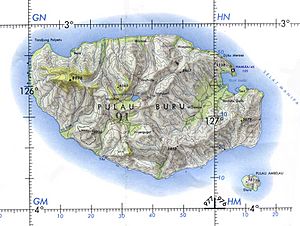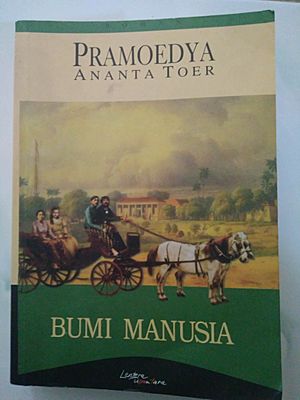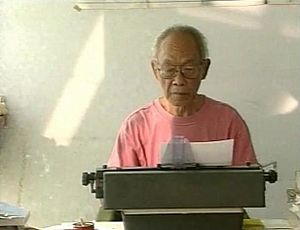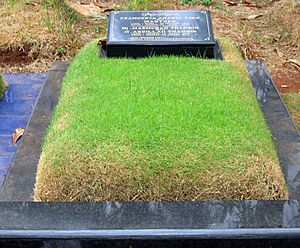Pramoedya Ananta Toer facts for kids
Quick facts for kids
Pramoedya Ananta Toer
|
|
|---|---|
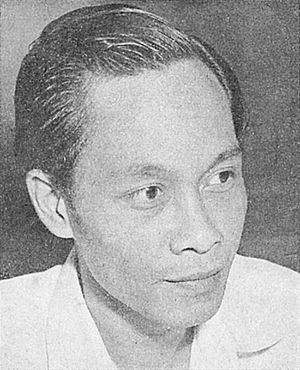
Pramoedya Ananta Toer, 1950s
|
|
| Born | 6 February 1925 Blora, Dutch East Indies |
| Died | 30 April 2006 (aged 81) Jakarta, Indonesia |
| Occupation | Novelist, Essayist |
| Nationality | Indonesia |
| Citizenship | Indonesian |
| Signature | |
 |
|
Pramoedya Ananta Toer (born February 6, 1925 – died April 30, 2006) was a very important writer from Indonesia. He wrote many kinds of stories, like novels, short stories, and essays. His writings often shared his own life story and the history of Indonesia.
Pramoedya faced many challenges because of his writing. The Dutch government, who ruled Indonesia for a long time, put him in prison from 1947 to 1949. Later, the Indonesian government led by Suharto also sent him to a prison island from 1965 to 1979.
Governments often didn't like what Pramoedya wrote. They tried to stop his books from being published in Indonesia. This is called censorship. Even though his books were banned at home, he became very famous around the world.
He wrote his most famous books, the Buru Quartet, while he was a prisoner. He wasn't allowed to have paper or pens. So, he told the stories aloud to other prisoners. They helped him write them down and secretly get them out of prison.
Pramoedya spoke out against unfair rules and corruption in Indonesia. He believed in freedom of speech. Many people around the world worked to help him get his freedom back.
Contents
Pramoedya's Early Life
Pramoedya was born on February 6, 1925, in a town called Blora. This town is on the island of Java in what was then the Dutch East Indies. This means Indonesia was ruled by the Netherlands at that time.
He was the oldest son in his family. His father was a teacher and was involved in an early Indonesian group that wanted independence. His mother sold rice. Pramoedya first went to a special school for radio in Surabaya. But he finished school just as Japan invaded Indonesia in 1942.
During World War II, Japan took control of Indonesia. Pramoedya first supported the Japanese. He thought they might be better than the Dutch rulers. He worked for a Japanese newspaper in Jakarta. But the Japanese military was very harsh. Many Indonesians, including Pramoedya, soon turned against them.
After Japan lost the war, Indonesia declared its independence on August 17, 1945. This started a war against the Dutch, who wanted to rule Indonesia again. Pramoedya joined a group fighting for Indonesia's freedom. He wrote stories and news to support the Indonesian cause. The Dutch put him in prison from 1947 to 1949. While he was in prison, he wrote his first important novel, The Fugitive.
Becoming a Famous Writer
After Indonesia became independent, Pramoedya wrote about the challenges of the new country. He also wrote stories based on his own experiences during World War II. He traveled to other countries, like the Soviet Union and People's Republic of China, to learn about their cultures.
In Indonesia, Pramoedya became known for his strong opinions about literature and society. He joined a group of left-wing writers. His writing started to focus more on political ideas. For example, his story Korupsi (Corruption) was about a government worker who became corrupt. This story caused problems for him with the government of President Sukarno.
Pramoedya also taught at a university. He realized that the Dutch rulers had changed how Indonesian language and literature were taught. He tried to find old writings that had been forgotten.
He had good feelings towards Indonesian Chinese people. This was unusual because many Chinese people in Indonesia faced unfair treatment. Pramoedya wrote a series of letters about the history of Indonesian Chinese people. He also criticized the government for focusing too much on Java and not enough on other parts of Indonesia. Because of this, the military arrested him. He was jailed for nine months.
Life as a Political Prisoner
In October 1965, the army took power in Indonesia. This was the start of a new government led by Suharto. This government was very much against communism. Pramoedya was part of a writers' group that was linked to the Indonesian Communist Party. So, Suharto's government called him a communist and an enemy of the country.
Pramoedya was arrested, beaten, and put in prison without a trial. He was first held on an island called Nusa Kambangan. Then he was sent to a prison island called Buru in eastern Indonesia. His books were banned.
Even though he was not allowed to write in prison, he created his most famous books, the Buru Quartet. These are four historical novels that tell the story of how Indonesian nationalism grew. They are partly based on his own life. The books are called: This Earth of Mankind, Child of All Nations, Footsteps, and House of Glass.
The books feature strong female characters from different backgrounds. They show how difficult life was under colonial rule. They also show how people fought for their freedom and independence. These books are special because they tell personal stories. They show how individuals are part of big historical events.
Before he was arrested, Pramoedya had done research for these books. But when he was put in prison, his library was burned. Many of his notes and early writings were lost. On Buru Island, he wasn't even allowed a pencil. He thought he would never be able to write the novels down. So, he told the stories to his fellow prisoners. Other prisoners helped him by doing extra work so he could focus on remembering the stories. Eventually, he was able to write them down.
The "Buru Quartet" got its name from the prison where he created them. These books have been translated into many languages, including English. By 2005, they were in 33 languages. Many people outside Indonesia thought these were amazing books and they won many awards. But the Indonesian government banned them. So, one of Indonesia's most famous literary works was hard for Indonesians to read. People living abroad scanned copies and shared them online with people in Indonesia.
Freedom and Later Writings
Pramoedya was finally freed from prison in 1979. But he was still kept under house arrest in Jakarta until 1992. This meant he had to stay at home and couldn't leave freely.
During this time, he published The Girl From the Coast. This novel was partly based on his grandmother's life. He also wrote Nyanyi Sunyi Seorang Bisu (1995), which means A Mute's Soliloquy. This book was his autobiography. It was based on letters he wrote to his daughter from prison, but he wasn't allowed to send them.
He continued to write many articles criticizing the Indonesian government.
Pramoedya passed away on April 30, 2006, due to health problems. He was highly praised for his writing and won many awards. Many people believed he deserved the Nobel Prize in Literature.
Pramoedya's writings show how big world events affected Indonesia and its people. He also shared his own difficult experiences of being imprisoned and censored. He fought for the right to express himself freely.
Awards and Recognition
Pramoedya Ananta Toer received many important awards for his writing and his fight for freedom of speech:
- 1988 PEN/Barbara Goldsmith Freedom to Write Award
- 1989 The Fund for Free Expression Award, USA
- 1992 English P.E.N Centre Award, Great Britain
- 1992 Stichting Wertheim Award, Netherlands
- 1995 Ramon Magsaysay Award for Journalism, Literature, and Creative Communication Arts
- 1999 Doctor Honoris Causa from the University of Michigan
- 1999 Chancellor's Distinguished Honor Award from the University of California, Berkeley
- 2000 Chevalier de l'Ordre des Arts et des Lettres, France
- 2000 11th Fukuoka Asian Culture Prize
- 2004 Norwegian Authors' Union award
- 2004 Pablo Neruda Award, Chile
- 2005 Global Intellectuals Poll by Prospect
Major Works
- Kranji-Bekasi Jatuh ("The Fall of Kranji-Bekasi") (1947)
- Perburuan (The Fugitive (novel)) (1950)
- Keluarga Gerilya ("Guerilla Family") (1950)
- Bukan Pasar Malam (It's Not an All Night Fair) (1951)
- Cerita dari Blora (Story from Blora) (1952)
- Gulat di Jakarta ("Wrestling in Jakarta") (1953)
- Korupsi (Corruption) (1954)
- Midah - Si Manis Bergigi Emas ("Midah - The Beauty with Golden Teeth") (1954)
- Cerita Calon Arang (The King, the Witch, and the Priest) (1957)
- Hoakiau di Indonesia (Chinese of Indonesia) (1960)
- Panggil Aku Kartini Saja I & II ("Just Call Me Kartini I & II") (1962)
- Gadis Pantai (Girl from the Coast) (1962)
- The Buru Quartet
- Bumi Manusia (This Earth of Mankind) (1980)
- Anak Semua Bangsa (Child of All Nations) (1980)
- Jejak Langkah (Footsteps) (1985)
- Rumah Kaca (House of Glass) (1988)
- Nyanyi Sunyi Seorang Bisu (A Mute's Soliloquy) (1995)
- Arus Balik (1995)
- Arok Dedes (1999)
- Mangir (1999)
- Larasati (2000)
- Perawan Remaja dalam Cengkeraman Militer: Catatan Pulau Buru (2001)
- All That Is Gone (2004)
- Narration for the Dutch film Jalan Raya Pos Great Post Road (film) about the Great Post Road
Books about Pramoedya Ananta Toer
- Citra Manusia Indonesia dalam Karya Pramoedya Ananta Toer, by A. Teeuw, Pustaka Jaya, Jakarta, 1997.
- Pramoedya Ananta Toer dan Sastra Realisme Sosialis, by Eka Kurniawan, Gramedia Pustaka Utama, Jakarta, 2006.
- Exile : Pramoedya Ananta Toer in conversation with Andre Vltchek and Rossie Indira (Chicago, Ill. : Haymarket Books, 2006). ISBN: 1-931859-28-0.
See also
 In Spanish: Pramoedya Ananta Toer para niños
In Spanish: Pramoedya Ananta Toer para niños


